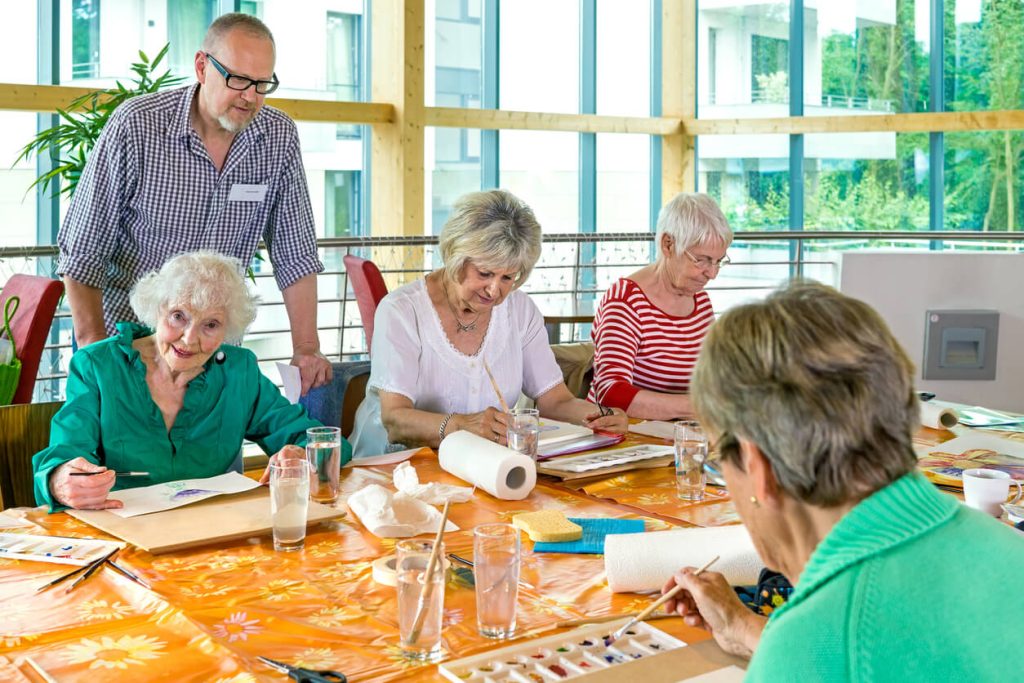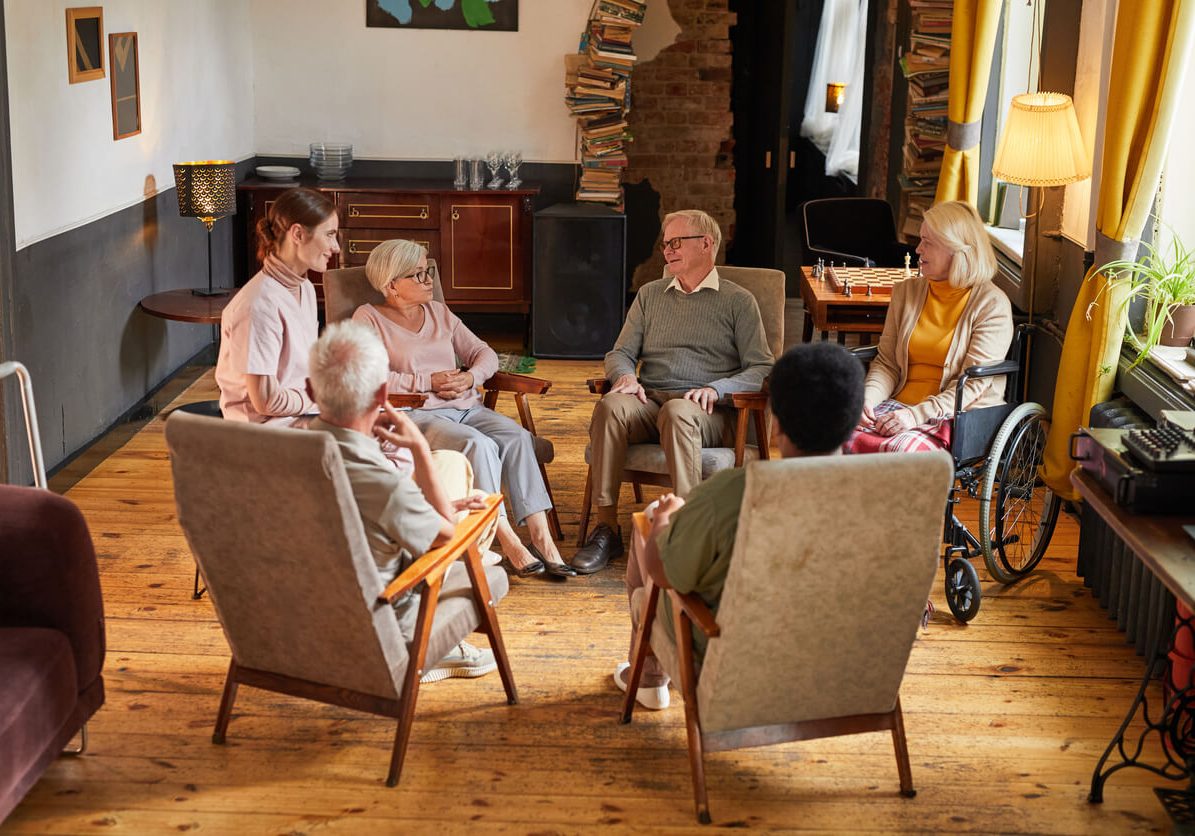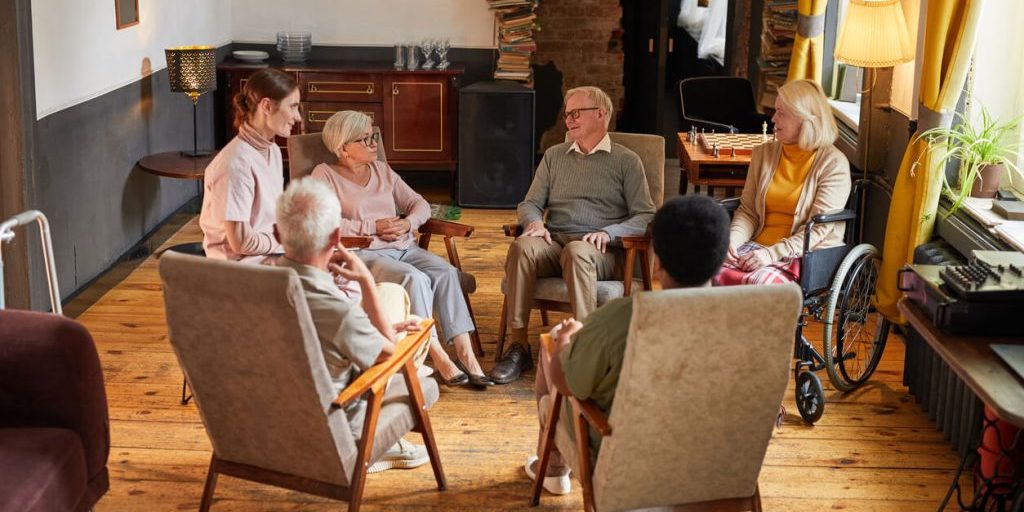Cognitive stimulation therapy (CST) is a structured, evidence-based intervention designed to improve cognitive function, enhance mental engagement, and boost the quality of life for people living with dementia.
Used as a non-pharmacological approach for people with mild to moderate cognitive impairments, such as those caused by Alzheimer’s disease or other forms of dementia, CST has developed into an internationally recognised support1. Generally, CST is undertaken in group sessions with trained facilitators who lead a series of enjoyable activities that also stimulate people’s thinking, concentration and memory.
There is a growing body of evidence that the therapy is effective to improve wellbeing for people living with dementia – at least in the short-term – and can boost the cognition of people who are also taking some medications2. CST is often delivered in a course over a period of several weeks, with participants attending regular sessions. The therapy’s structure, focus on social interaction, and variety of activities can make it an effective approach.
What is cognitive stimulation therapy?
Cognitive stimulation therapy is used to slow the progression of dementia decline – and improve wellbeing – by boosting thinking and attention skills. It is based on the knowledge of neuroplasticity, the way the brain can continue to adapt and form new connections through stimulation.
Originally devised in the United Kingdom, CST engages people living with dementia in discussions about current events and asks them about their opinions. However, the focus is not on the answers, it is on the exchange of ideas3. Music relevant to the era of the people in the group will be played and there may be sing-a-longs. Likewise, photos, objects, and prompts can be used to trigger discussions.
In addition to the positive impacts on cognition, the therapy also provides benefits through positive social interaction in the group, reducing potential loneliness, and boosting confidence and self-esteem. A course may run over a few months, and sometimes “maintenance” sessions are provided.
Cognitive stimulation therapy activities
 Cognitive stimulation therapy activities are tailored to the participants’ abilities and interests, and could include talking about their memories, games, puzzles, discussions of current events and creative pursuits.
Cognitive stimulation therapy activities are tailored to the participants’ abilities and interests, and could include talking about their memories, games, puzzles, discussions of current events and creative pursuits.
While CST aims to challenge participants’ cognitive abilities, it is done so in a supportive and non-threatening environment. Examples of CST activities include4:
- Word association games: Participants are given a word, and they need to come up with related words or words that start with a particular letter. This activity helps stimulate language and word recall abilities.
- Reminiscence sessions: Participants share personal stories and memories related to a specific topic. This encourages the use of long-term memory.
- Discussion of current events: Group discussions about recent news, events, or everyday topics.
- Picture-based activities: Participants might be shown pictures of various scenes, objects, or people and asked to describe or discuss what they see.
- Creative arts: Art and craft activities, such as painting, drawing, or making collages, provide an outlet for creativity, fine motor skills, and self-expression.
- Physical exercises: Simple physical movements and exercises can improve blood circulation, boost mood, and support overall cognitive function.
- Cooking or baking activities: Following step-by-step instructions can enhance sequential thinking and attention to detail.
- Name that tune: Participants try to identify the song or the artist of a song extract. This activity encourages auditory recognition and memory recall.
Benefits of cognitive stimulation therapy for people living with dementia
 Cognitive stimulation therapy has been found to be an effective intervention.
Cognitive stimulation therapy has been found to be an effective intervention.
A 2014 study of of 236 people with dementia from nine care homes and nine community services found CST improved quality of life six months after the course, as rated by the participants themselves5. At the three-month mark, there were improvements in quality of life and in the activities of daily living.
Further, a 2019 review of 238 studies found “moderate” evidence for general cognitive functioning, language comprehension and production, and quality of life from CST6. There was less evidence for impacts on short-term memory, orientation, praxis, depression, social and emotional loneliness, behaviour, and communication in people with dementia, leading the researchers to call for more studies on CST.
“The present review highlights the value of this program as part of dementia care services to sustain the cognitive functioning and quality of life of people with dementia,” the review said.
While CST can provide cognitive and social benefits for some, its effectiveness can vary based on individual characteristics and the stage of cognitive impairment.
Cognitive stimulation therapy training course
AQ runs a cognitive stimulation therapy program to support people living with dementia in Brisbane. The sessions aim to actively stimulate and engage participants in an optimal group learning environment, and run once a week in 10-week blocks for about an hour. The small groups are six or fewer people. Eligibility is through an initial OT assessment to determine an individual’s suitability for the group therapy. Call 07 3422 3000 for more information.
Contact: 07 3422 3000 or intaketeam@alzqld.org.au
1 Rai, H., Yates, M., Orrell, M., “Cognitive Stimulation Therapy for Dementia”, Clinics in Geriatric Medicine, 2018, Vol 34 (4), https://www.geriatric.theclinics.com/article/S0749-0690(18)31003-6/fulltext, accessed August 2023.
2 Holden, E., “Cognitive stimulation therapy for dementia: Provision in National Health Service settings in England, Scotland and Wales”, Dementia, 2021, Vol 20 (5), https://journals.sagepub.com/doi/10.1177/1471301220954611, accessed August 2023.
3 Kanareck, D., Narunski, N., Draper, B., Australian Adaptations For Cognitive Stimulation Therapy, Prince of Wales Hospital Aged Care Psychiatry Service, 2015, https://www.dementiaresearch.org.au/wp-content/uploads/2020/01/1374-1_2_3_australian_cst_guidebook_final.pdf, accessed August 2023.
4 Dementia UK, https://www.dementiauk.org/cognitive-stimulation/#:~:text=Cognitive%20stimulation%20therapy%20involves%20a,such%20as%20baking%20or%20gardening.
5 Orrell, M., Aguirre, E., Spector, E., “Maintenance cognitive stimulation therapy for dementia: single-blind, multicentre, pragmatic randomised controlled trial”, British Journal of Psychiatry, 2014, Vol 204, https://www.cambridge.org/core/journals/the-british-journal-of-psychiatry/article/maintenance-cognitive-stimulation-therapy-for-dementia-singleblind-multicentre-pragmatic-randomised-controlled-trial/902E9DCF04D900E6CB6FD830B5A98A70, accessed August 2023.
6 Lobbia, A., Carbone, E., Faggian, S., “The efficacy of cognitive stimulation therapy (CST) for people with mild-to-moderate dementia”, European Psychologist, 2018, https://econtent.hogrefe.com/doi/10.1027/1016-9040/a000342, accessed August 2023.







